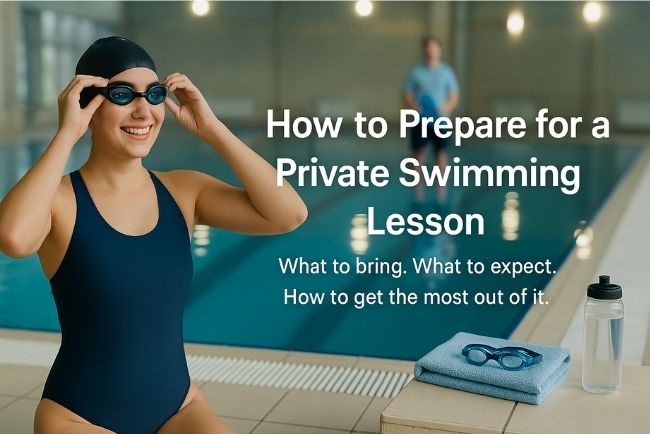Swimming is a skill that not only offers lifelong benefits but also provides a fun and active way for children to build confidence.
Private swimming lessons can be a great choice for children who need more personalized attention or those who may feel nervous in a group setting.
In this blog post, we will discuss how to prepare your child for private swimming lessons to ensure they have a positive and rewarding experience.
Private swimming lessons are one-on-one sessions with a coach, tailored to meet the specific needs and learning pace of your child.
These lessons provide individualized attention and allow the coach to focus on your child’s strengths and areas that need improvement.
Private Lessons vs. Group Sessions
Unlike group sessions where children may feel distracted or self-conscious, private lessons offer a focused environment. Your child will have the coach’s full attention, which can be especially helpful for kids who might be shy or have specific challenges with swimming.
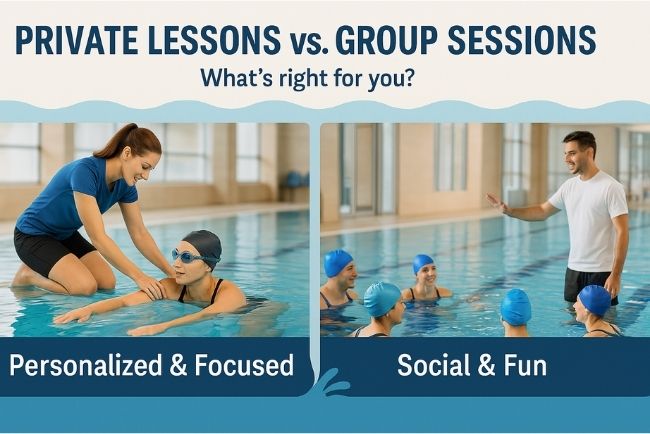
Private lessons give coaches the ability to craft lesson plans that address your child’s unique needs, which can lead to faster progress and a more enjoyable learning experience. Personalized attention allows coaches to move at a pace that suits your child, fostering greater confidence and skill development.
Why Preparation Matters
Proper preparation is key to setting your child up for success. Private lessons can be an exciting and rewarding experience, but it’s important to ease any fears or anxieties your child may have. With the right mindset and proper preparation, your child can approach swimming lessons with enthusiasm and confidence.
I. Familiarizing Your Child With Water
Start With Simple Water Play
Before the first lesson, spend some time in the water with your child. Whether it’s playing in the bathtub or wading into a shallow pool, getting them used to being in and around water will help reduce anxiety during their lessons. You can encourage your child to splash, float, or practice blowing bubbles to build comfort.
Discuss Basic Pool Rules Early
Teach your child some basic pool rules to ensure their safety and prepare them for what to expect in lessons. Explain that they should always listen to the coach, never run near the pool, and keep their head above water unless instructed otherwise.
Safety Instructions Around Water
Emphasize safety when your child is around water. Teach them to never swim alone, to always ask for permission before entering the pool, and to stay within safe areas of the pool.
II. Selecting the Right Swim Gear
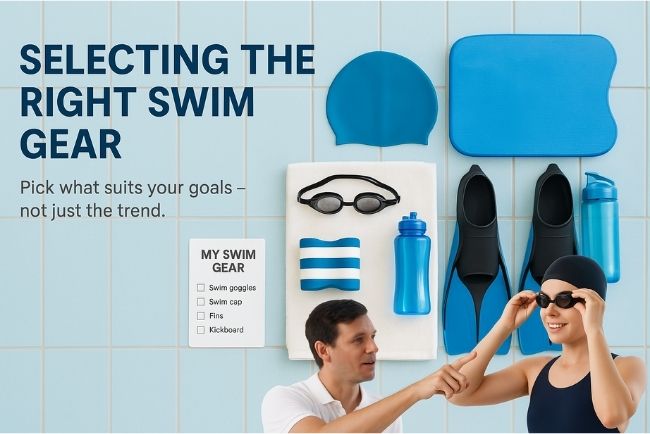
Comfortable Swimsuit
Choose a swimsuit that is comfortable and fits well, as a snug, properly fitting suit will make swimming easier and more enjoyable. Be sure to check for any skin sensitivities that may make certain materials uncomfortable.
Goggles and Swim Cap
Invest in a good pair of goggles to help your child see clearly underwater and reduce discomfort from water in the eyes. A swim cap can also be helpful, particularly for children with longer hair, as it keeps hair out of their face and reduces distraction.
Optional Swim Aids
Swim aids like floaties, kickboards, or fins can be useful, especially for younger children or beginners. If the coach recommends them, use them to help your child gain confidence. However, try to gradually phase them out as your child becomes more confident in the water.
III. Building a Positive Mindset
Talking About Swim Lessons in an Encouraging Way
Before the first swimming lesson, talk to your child in a positive and encouraging way about swimming. Emphasize that swimming is fun and that the lessons will be about learning new skills at their own pace. Use words like “fun,” “exciting,” and “progress” to create a positive outlook.
Addressing Fears and Concerns
It’s normal for children to feel anxious about swimming, especially if they are new to the water.
Have an open conversation with your child about any fears they may have, such as fear of failing or fear of getting their face wet.
Let them know that it’s okay to feel nervous and that the coach is there to help them.
Instilling Confidence
Celebrate every little victory your child achieves, like putting their face in the water or kicking their legs. Reinforce the idea that everyone learns at their own pace, and that trying their best is what matters most.
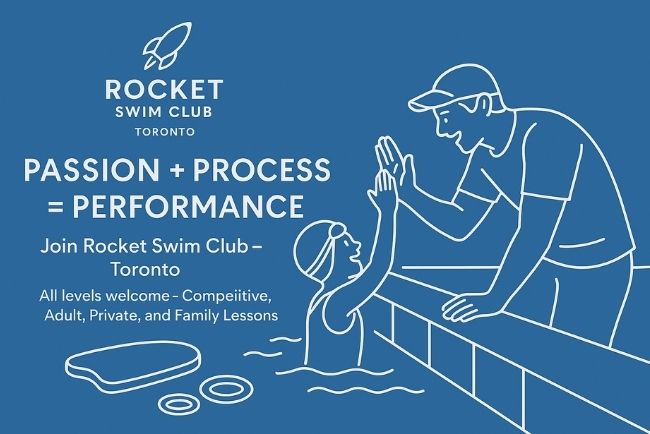
Looking For a Perfect swimming Club in Toronto, Canada?
You’re in the right place. We located in Toronto’s High Park area, Rocket Swim Club is where swimmers of all levels grow—from beginners to future champions.
We offer:
✅ Competitive & Non-Competitive Programs
✅ Adult & Private Lessons
✅ Family & Personalized Coaching
Led by experienced coaches who care about your progress, not just your lap time. We only operate in Toronto—so all our focus stays right here, in your city. Join the club that swims for your goals. Memberships open now for the Greater Toronto Area.
IV. Physical Preparation at Home
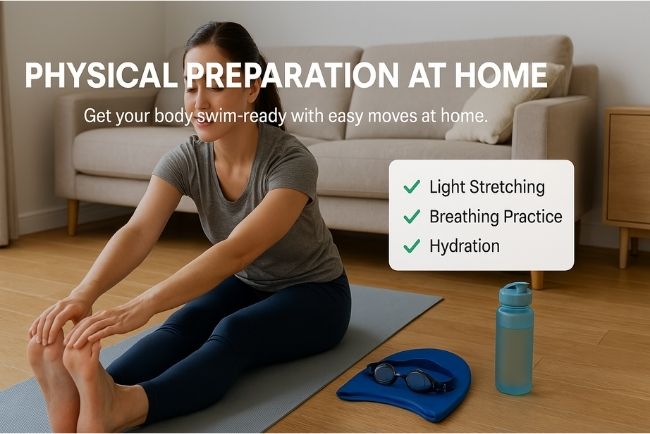
Light Exercises and Stretches
Before their first lesson, help your child warm up their muscles by doing simple arm and leg stretches. This prepares their body for movement in the water and helps them understand basic coordination.
Breathing Techniques
Practicing breathing techniques at home can also be beneficial. Encourage your child to blow bubbles in the bathtub or practice holding their breath for a few seconds to make it easier when they are in the pool.
Positive Sleep and Nutrition Habits
Ensure that your child gets a good night’s rest before their lesson so they are focused and energized. Proper nutrition, such as balanced meals or healthy snacks, can also help them maintain energy throughout the lesson.
V. Setting Clear Goals and Expectations
Talk About Lesson Objectives
Set clear, achievable goals with your child for their swimming lessons. Simple milestones like floating, kicking, or learning to put their face in the water can help give them something to work toward.
Avoiding Performance Pressure
Remember that every child learns at their own speed. Avoid putting pressure on your child to perform perfectly. Celebrate their efforts, regardless of how quickly they progress.
VI. Making the First Lesson a Success
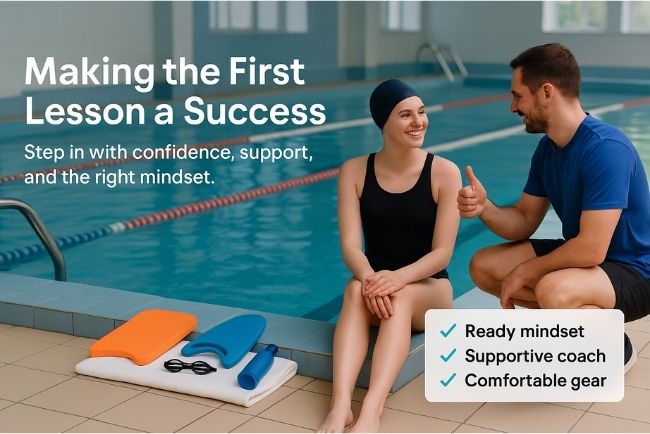
Arriving Early
Arriving early to the pool allows your child time to acclimate to the environment and feel comfortable before the lesson starts. Avoid rushing, as it can create unnecessary stress.
Meeting the Coach
Introduce your child to the coach in a friendly and casual manner. Building a rapport with the coach early on can help your child feel more comfortable and safe during their lessons.
Observing Lesson Structure
Understanding the structure of the lesson, such as warm-up, skill practice, and cool-down, helps your child know what to expect. Encourage them to follow the coach’s guidance and stay engaged throughout the lesson.
VII. Encouraging Practice and Reinforcement
Short Practice Sessions Between Lessons
Between lessons, encourage your child to practice some of the skills they’ve learned, such as kicking or arm strokes. Short practice sessions in a shallow area of the pool can build confidence without overwhelming them.
Positive Reinforcement
Use praise and rewards to motivate your child. Reinforce their efforts and avoid comparing them to others, as each swimmer progresses at their own pace.
Open Communication With the Coach
Stay in touch with the coach to track your child’s progress and learn any tips for additional practice at home. The coach may have specific feedback that will help your child improve.
VIII. Ongoing Support and Motivation
Maintaining Consistency
Consistent practice is key to swimming success. Keep a regular lesson schedule and encourage your child to stick with it, even if progress seems slow at times.
Addressing Setbacks
Understand that setbacks and occasional reluctance are a natural part of learning. Be patient and continue to offer support and encouragement.
Celebrating Milestones
Celebrate your child’s achievements, no matter how small. Whether it’s swimming a full lap or mastering a new stroke, recognizing these milestones helps boost their confidence and motivation.
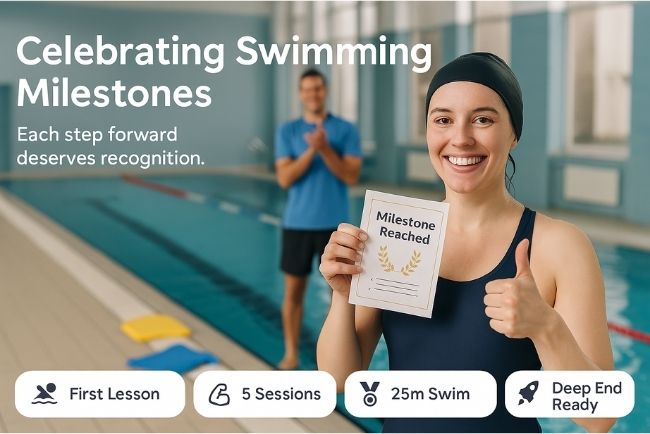
IX. Conclusion
In summary, preparing your child for private swimming lessons involves creating a positive and supportive environment that encourages both physical and mental readiness.
By familiarizing them with water, selecting the right gear, setting achievable goals, and offering ongoing encouragement, you’ll help your child develop a love for swimming and build lifelong skills.
At Rocket Swim club in Toronto, we believe in making swimming a fun and empowering experience for every child. Here in Toronto’s high park area, we offer private lessons tailored to your child’s unique needs.
Contact us today for a free trial lesson and watch your child take their first steps toward becoming a confident swimmer!


